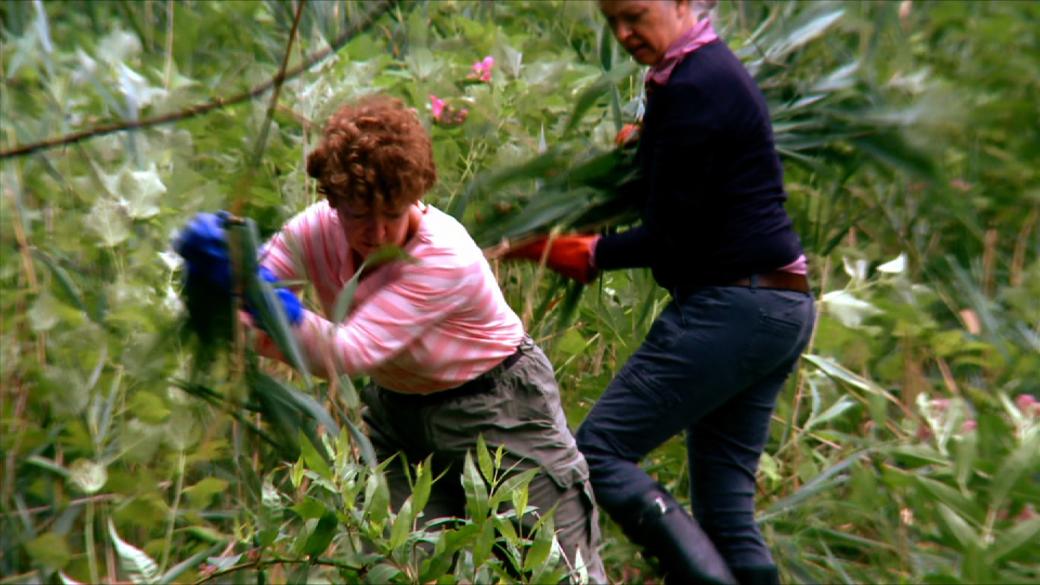A Report from Paris: New Day Films take on climate change

Paris Climate Talks
In December 2015, I had the rare opportunity to screen my film There Once Was an Island at the Paris climate talks and it got me thinking about the role films can play at environmental conferences and festivals.
As international delegates work around the clock to secure a new climate deal and activists lobby furiously on the streets, it’s easy to lose sight of those smaller voices; the communities and individuals who are the first victims of climate change but often the last to be heard. Films can be a powerful and effective way to keep our priorities in focus, and to remember what is actually at stake.
There Once Was an Island was one of two documentaries invited to screen at the COP21 Climate Change Summit as part of an exhibition entitled "Entwined Destinies: Migration, Environment and Climate Change.” The feature documentary tells the story of three Pacific islanders living on an atoll only one meter above sea level and who face the threat of becoming some of the world’s first environmental refugees. Following its screening, a panel of four experts discussed issues related to migration and climate change. Event organizer Daria Mokhnacheva remarked, “The audience was very moved by the message that the film conveyed. The screening also led to a very interesting discussion about how climate change is perceived by local communities, and how we can all act individually to help mitigate climate change.” As a filmmaker who wants to have the greatest impact possible and inspire social change, I can’t think of a better place to screen my film. I also know that for my characters it will mean a great deal to learn that their story is being shared among powerful government officials who have the ability to change the course of their future.

Other New Day films have also been having a powerful impact at environmental conferences around the world. Greta Schiller’s film, The Marion Lake Story: Defeating the Mighty Phragmite screened at the Justainabilty conference at Franklin Roosevelt University in Lugana, Switzerland. The documentary explores one of the largest citizen-led battles to eradicate the highly invasive phragmite reed in New York State. The film’s screening at the conference sparked a discussion among delegates over local conservation efforts in Switzerland versus government policy, and many questions were asked about how the workers involved in the clean up of the lake were being paid. Reflecting on the screening, Schiller writes:
Screenings in academic conferences are important because too often the academics who see my film understand the theoretical principles of biodiversity but have little idea of what cleaning up invasive weeds entails and how much maintenance is involved.
Schiller’s ability to show a more holistic picture of this issue impressed one German professor so much that he invited her to apply for a prestigious fellowship at the Rachel Carson Center for Environment and Society in Munich and now, as a Carson Center Fellow, Schiller is furthering her conservation work through the production of a new documentary called Earth Repair which explores three distinct ecological restoration projects in Europe, India and Australia.

One of New Day’s most recent releases White Earth, an Oscar-nominated film about the oil boom in North Dakota, is currently gaining significant attention at environmental festivals. In the past few months, director Christian Jensen has screened the short documentary at three notable environmental film festivals: The Great Lakes Environmental Film Festival, The American Conservation Film Festival, and Telluride Mountain Film Festival. In an email conversation with Jensen, we discussed the ways in which festivals-- much like academic and political conferences-- allow filmmakers to engage with audiences in a deeper, more proactive way. Jensen noted that the current plunge in oil prices has made his film a jumping point for further conversations on what has happened in North Dakota now that fracking operations have become unprofitable. He also added that while many of his audience members were already involved in activism and familiar with issues of land development and resource management, his film offered them an alternative point of view:
In focusing primarily on the perspective of children living in the oil boom, White Earth has encouraged audiences to shift from the major dialogues about big oil, oil worker safety, and industrial environmental degradation, to the often overlooked inner landscapes of the children whose lives and communities are undergoing dramatic change.
Now that the Paris Climate Talks have wrapped up and governmental officials have gone home, it seems that world leaders are finally embracing the fact that climate change is a very real global issue that affects all of us. After personally witnessing the power film has to connect audiences and inspire change, I am so grateful that there are so many New Day films leaving a lasting impact across the globe.
To find out more about There Once Was an Island, The Marion Lake Story, White Earth, and other New Day documentaries that explore issues of climate change and conservation, please visit our rich collection of environmental films.